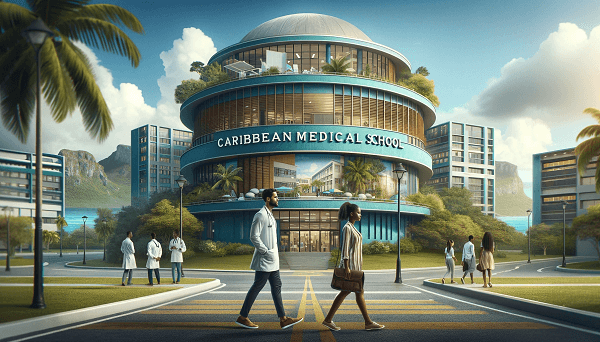Best Caribbean Medical Schools: The 2024 Medlink Students Review


In recent years, Caribbean medical schools have emerged as a strong contender for high-quality medical education, offering a gateway to fulfilling medical careers. The mantra’ Sun, Sea & Study Medicine’ captures the unique charm of these institutions. Whether you aspire to become a successful doctor in the United Kingdom, the United States or any other part of the world, the Caribbean may be your ideal destination.
This 2024 review takes a deep dive into the best Caribbean medical schools, analysing various aspects of higher medical education like admission requirements, tuition fees, clinical rotation opportunities, and more to provide a comprehensive overview for 2024 med school applicants.
If you’re ready to learn more about the top medical schools in the Caribbean, let’s dive into the 2024 Medlink Students Review:
The Benefits of Studying at Caribbean Med Schools In 2024
The Caribbean is a quickly growing and thriving region, especially when it comes to medical education. Local governments and international organisations such as the Commonwealth of Nations and the Caribbean Community are actively working together to support the success of the region while promoting global collaboration.
Over time, the Caribbean has captured the attention of prospective MD students, largely due to its impressive selection of globally recognised medical universities.
But let’s delve a bit deeper and highlight some compelling reasons why Caribbean Medical Universities might be a tempting option for you:
Internationally recognised medical universities
Accredited Caribbean medical schools award internationally recognised degrees, empowering their graduates to practise medicine across a number of global destinations, including the UK, the US, India, and beyond.
The best Caribbean Medical Schools we’ve shortlisted for you below are:
- Accredited by their government or local Ministry of Education
- Listed in the World Directory of Medical Schools (WDOMS);
- Fulfil the criteria of the GMC for standalone medicine programmes, including the requirement to comprise 5,500 contact hours. This allows Carribean Med University graduates to take the PLAB or UMKLA exams & earn their licensure to become a doctor in the United Kingdom.
- Grant internationally recognised degrees that allow students to become successful healthcare professionals in various countries across the world.
Tropical climate & peaceful nature
In the relaxed atmosphere of the soothing ocean breeze, lush greenery, and laid-back lifestyle, students can truly focus on their studies and achieve their best.
Flexible admission process
Many Caribbean Medical Universities have adopted a no-entry-exam policy, offering flexibility that is often absent from European or US MD courses.
Instead, applicants are assessed based on their previous academic record, their performance in an interview, and the overall strength of their application. If you are not certain as to whether you are eligible for the MD Course at the Top Caribbean Universities, just reach out to a Medlink Advisor, and we will guide you through the admission process with ease.
Check your email to Book a FREE call
with an expert advisor
Look at your promotions/spam folders, just in case.
Affordable tuition fees and cost of living
While the cost of studying medicine in the Caribbean is comparable to that in the US or Western Europe, Medlink Students provides a unique opportunity for students to secure a scholarship covering up to 50% of their tuition fees throughout their 4-year course.
Fast-track 4-year MD programmes
The medical universities in the Caribbean have a streamlined US-based curriculum, which consists of 2 years of studying the Basic Sciences of medicine and 2 years of Clinical Rotations.
Flexible clinical rotations
Clinical training is carried out in accredited international teaching hospitals throughout the Caribbean, the US, and many countries around the world.
The top Caribbean medical schools offer their students the flexibility to choose where they want to conduct their clinical rotations, even if their choice is their home country. The only requirement is that students must declare their preferred location in advance and cover any difference in tuition fees. The availability of rotation placements depends on the cohort size and hospital capacity.
Residency opportunities with Caribbean medical schools
Once students have earned their medical degrees from a Caribbean medical school, the crucial next stage is securing a residency position. Many Caribbean institutions have forged partnerships with accredited hospitals worldwide to provide a wealth of residency opportunities for their graduates.
Opportunity to make a difference
Students that study medicine in the Caribbean are given the opportunity to take part in the Medical Students without Borders programme.
This initiative is aimed at providing students with the chance to carry out their clinical training in struggling regions of the world where they can make an actual difference.
The Top 3 Medical Universities in the Caribbean
Currently, there are over 90 medical universities in the Caribbean region.
We will guide you on how to successfully shortlist the 3 most appealing Caribbean Med Schools in terms of rewarding academic experiences and teaching processes:
The University of Health Sciences School of Medicine in Antigua & Barbuda
The University of Health Sciences Antigua (UHSA) was established in 1982 on the stunning island of Antigua. It is accredited by key international organisations, ensuring its graduates are eligible for ECFMG certification, a critical step for securing residency placements and medical licensure in the United States.
The university offers a 4-year graduate entry MD programme, which provides comprehensive theoretical learning and ample hands-on clinical training in accredited teaching hospitals across the Caribbean and the US. UHSA also offers a pre-med programme that lasts 3 semesters and leads into the main MD course.
UHSA places a strong emphasis on producing globally competent doctors and encourages students to participate in outreach programmes that make a meaningful difference in underserved communities. The University of Health Sciences Antigua is globally recognised for its focus on academic excellence and the development of compassionate healthcare professionals.
Texila American University College of Medicine - Guyana Campus
Established in 2010, Texila American University (TAU) is a prominent medical school located in Georgetown, Guyana. The university is recognised as the best in the country, offering a pre-med course and a 4-year and 5-year Doctor of Medicine programmes designed to fast-track students' medical careers, regardless of their starting point.
TAU is accredited by the Caribbean Accreditation Authority for Education in Medicine and Other Health Professions (CAAM-HP) and the Accreditation Commission on Colleges of Medicine (ACCM), ensuring that its curriculum meets and exceeds international standards.
Texila American University is known for training exemplary medical professionals with a 94% USMLE Step 1 pass rate. Additionally, it offers comprehensive clinical training in the Georgetown Public Hospital Corporation (GPHC) or ACGME-accredited teaching hospitals in Arizona, USA.
Ross University School of Medicine
Ross University School of Medicine (RUSM) is an internationally recognised medical university located on the beautiful island of Barbados. The university was established in 1978 and deservedly has a spot in the “Big 4” best Caribbean medical schools known for providing outstanding medical education.
Ross University offers a 4-year graduate entry medicine course. The first 2 years teach students the Basic Sciences of medicine in the RUSM campus on Barbados. The latter 2 years are devoted to clinical training in accredited teaching hospitals in the US.
This medical school’s motto dedicated to the science of healing is representative of the university’s long-standing tradition of educating the next generation of medical professionals. RUSM has a proven track record of training exceptional doctors who consistently achieve success on a global scale.
When to Apply for Medical Universities in the Caribbean
Caribbean medical schools employ a rolling admissions system, permitting applications all year round. Nonetheless, these universities operate on a trimester system, allowing students to commence their studies in several distinct months of the year:
- January
- May
- September
The application process generally takes 4-6 weeks, so it is crucial to apply in advance. Keep in mind that the seats are limited and early applicants have a higher chance of getting accepted and qualifying for a Medlink Students scholarship to UHSA.
Caribbean Medical Schools vs UK Medical Schools
A favourite destination for medical students worldwide is the United Kingdom. However, the Caribbean’s growing prominence in the medical education scene makes for an intriguing comparison:
| Aspect | Caribbean Medical Universities | UK Medical Universities |
| Admission | No entry exams | UCAT test |
| Medlink Students Scholarship | Yes, up to 50% | No |
| Curriculum | Emphasis on US-based curriculum and international clinical training | UK-based curriculum with NHS placements |
| Duration of Programme | 4-year Graduate Entry Course | 5 - 6 years MD Course |
| Global Recognition | Accredited and internationally recognised | Globally recognised |
| Clinical Rotations | in the Caribbean, the US & accredited teaching hospitals around the world, including student’s home country | in the UK via the NHS system |
| Cost of Education | Often lower compared to the UK - $20,000 on average per year, but some may go as high as $70,000+ Significantly lower with a Medlink Students Scholarship - as low as $9,000 per year | Higher tuition fees, especially for overseas students - £23,500 yearly average for UK/EU students £35,000 on average for overseas students per year |
| Student Experience | Tropical Caribbean | in the Caribbean, the US & accredited teaching hospitals around the world, including student’s home country |
When it comes to high-quality medical education, both the UK and the Caribbean stand out as fantastic options. The choice between these regions will heavily depend on the individual preferences and future career plans of students.
The UK offers a traditional path with strong historical roots, rigorous training, and an internationally recognised education system. However, admission into UK medical schools can be highly competitive, with strict entrance exams, and tuition can be considerably higher, particularly for international students.
On the other hand, Caribbean medical universities provide a fresh, vibrant, and more flexible alternative to traditional routes. With their internationally recognised degrees, high standard of education, practical clinical training, and unique tropical environment, Caribbean medical schools have successfully positioned themselves as viable and attractive options for medical education.
Importantly, studying in the Caribbean does not restrict students from practising medicine in the UK or any other part of the world. Their degrees are globally recognised, and graduates are eligible for medical licensure in various countries.
Whether you’re attracted to the idea of studying under the Caribbean sun or amidst the UK’s multicultural urban vibrancy, the choice ultimately lies with you. Both paths lead to the same destination - a rewarding career in medicine.
To wrap it up, Caribbean medical universities offer world-class education, international opportunities, and an extraordinary learning environment. Renowned establishments like and Ross University serve as key pillars in this educational landscape.
Don’t hesitate to contact one of our expert advisors for a free consultation to learn more about studying medicine in the Caribbean and whether you qualify for a Medlink Students scholarship for the University of Health Sciences School of Medicine in Antigua.
Why We Care
Being 100% certain that you’re making the right decision for your medical education will not only ensure that you become a successful doctor, but it will also greatly improve your student experience. Here are the main factors that can make studying medicine in the Caribbean the perfect choice for you:
International recognition: The accredited Caribbean medical schools award medicine degrees that are globally recognised, allowing graduates to practise medicine in many countries around the world, including the UK, the US, India, and more.
Accelerated programmes: 4-year graduate entry MD courses offer a streamlined path to becoming a successful doctor.
Flexible admissions: Many Caribbean universities do not require entry exams, which makes the application process simple and straightforward. Instead, they opt for a holistic approach based on high school grades, motivation to study, and interview performance. This method creates opportunities rather than closing doors.
Affordable еducation: Tuition fees and the cost of living in the Caribbean can be lower than in the US or UK, especially with the additional scholarship opportunities available through Medlink Students.
Comprehensive clinical rotation options: Caribbean medical schools provide flexible clinical rotation opportunities in the Caribbean, the US, and other countries. This gives students the chance for diverse clinical experiences that will prepare them for a successful career in medicine.
Supportive environment: The tropical climate and relaxed lifestyle of the Caribbean create a conducive environment for focused studies and personal well-being.
Innovative programmes: Initiatives like Medical Students without Borders provide unique opportunities for students to gain clinical experience in underserved regions, making a meaningful impact early in their careers.
FAQs
Is the Caribbean a good place to study medicine?
Absolutely, from world-class medical education to providing a fantastic learning experience, the Caribbean has it all.
Are Caribbean medical degrees valid in the UK?
Yes, medical degrees from accredited Caribbean medical schools are recognised throughout the world.
How much does it cost to study medicine in the Caribbean?
On average, studying in the Caribbean costs between $13,750 and $27,990 per year. However, some universities have tuition fees as high as $70,000 per year.
Medlink Students provides exclusive scholarships to University of Health Sciences Antigua, potentially reducing eligible students’ tuition fees by up to 50% for the duration of their studies.
Can Caribbean medical graduates practise in India?
Yes, graduating from an accredited Caribbean med school will allow you to earn your licence to practise medicine in India and many other countries around the globe, including the UK and the US.
Do Caribbean medical schools accept international students?
Yes, international students are accepted, and the entire curriculum is taught in English.
How many years does it take to study medicine in the Caribbean?
Studying graduate entry medicine in the Caribbean takes 4 years.
If you aren’t a Bachelor’s graduate but still want to study medicine in the Caribbean, you can take a pre-med course that lasts between 16 months and 2 years.
What is Medical Students without Borders?
MSWB is a programme which lets students carry out their clinical training in countries with limited healthcare and resources. This gives students the opportunity to start making an actual difference in people’s lives from early on in their careers.
2 comments on “Best Caribbean Medical Schools: The 2024 Medlink Students Review”
Leave a Reply

About Medlink Students
Leading international recruitment company for medical students in Europe. British Council Certified Agents. 10+ years of experience and more than 10,000 students advised.









Hey, can you let me know more information about the pre med course offered by these caribean univerisities
Yes, we are more than happy to. Basically, the uni allows you to build the foundational knowledge in the sciences for you to be able to continue with the 4-year program.
We have a dedicated blog post with information on the pre-med courses offered by Caribbean universities. You can read it here.